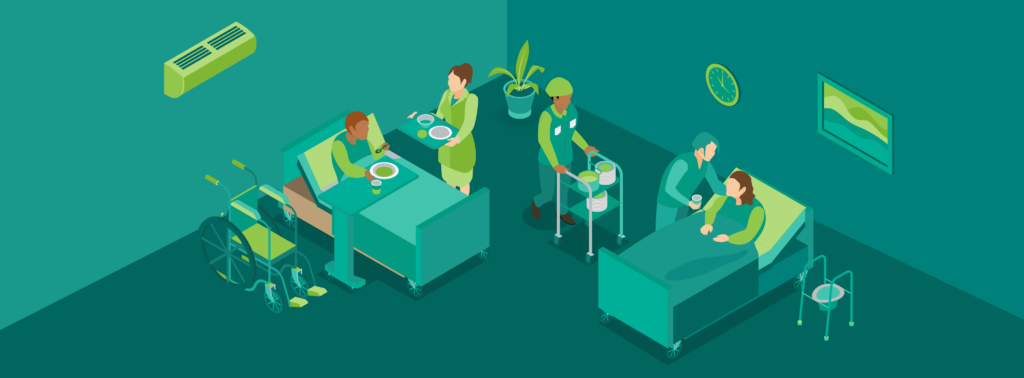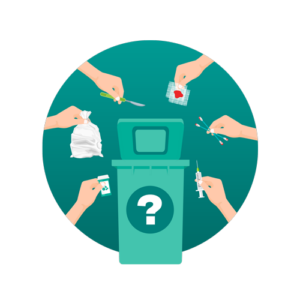The Importance of Waste Management in Non-Acute Care Facilities

Proper waste management in non-acute care facilities is crucial for ensuring regulatory compliance, protecting staff and patients and minimizing environmental impact.
TOPICS WE WILL COVER:
- What is Non-Acute Care, and How Does it Differ from Acute Care?
- Unique Waste Management Challenges in Non-Acute Settings
- Regulatory Compliance in Non-Acute Care Waste Management
- Implementing a Comprehensive Waste Management Program
- Partnering with Waste Management Experts
- Reach Out Today and Transform Your Non-Acute Care Facility
What Is Non-Acute Care, and How Does it Differ from Acute Care?
Acute and non-acute care facilities don’t just differ in the level of care provided, but also in their waste management needs.
Acute Care
Acute care refers to short-term, time-sensitive treatment for severe injuries or illnesses. This care is typically delivered in hospitals or specialized units designed to stabilize or treat patients in critical conditions. Examples of acute care services include emergency room visits, surgeries and intensive care.
Non-Acute Care
Non-acute care focuses on long-term management of chronic conditions, rehabilitation, and outpatient services. Non-acute facilities include long-term care homes, palliative care, rehabilitation centers and outpatient clinics, where care is provided for patients who do not require immediate emergency interventions but need consistent monitoring or treatment.
 Acute vs. Non-Acute Care: Key Differences in Waste Management
Acute vs. Non-Acute Care: Key Differences in Waste Management
Waste management needs in acute and non-acute care facilities can vary significantly. Hospitals produce a higher volume of infectious waste and other hazardous materials, while non-acute care settings may generate smaller quantities but still deal with hazardous biomedical and pharmaceutical waste. Unlike hospitals, non-acute care facilities often have limited space and fewer dedicated resources for waste management infrastructure, making it crucial to adopt strategies tailored to their unique requirements.
Examples of Non-Acute Care Facilities
- Long-term care homes
- Rehabilitation centers
- Outpatient clinics
- Home healthcare services
Examples of Acute Care Facilities
- Hospitals
- Emergency departments
- Trauma centers
- Intensive care units (ICUs)
Unique Waste Management Challenges in Non-Acute Settings
Managing waste in non-acute care settings presents specific challenges that differ from acute care environments.
Limited Infrastructure
For one, non-acute care facilities often lack the sophisticated waste management systems found in hospitals. With smaller spaces and fewer dedicated waste management staff, non-acute facilities may struggle to segregate and manage waste effectively. Without proper waste management systems, staff can inadvertently mishandle hazardous materials, increasing the risk to themselves, patients, and the environment.
 Diverse Waste Types
Diverse Waste Types
Non-acute care settings generate a variety of waste types, including:
- Biomedical waste (e.g., used syringes, soiled dressings)
- Pharmaceutical waste (expired medications)
- General waste (e.g., paper, food waste)
Even though these facilities produce smaller volumes of waste compared to hospitals, the presence of hazardous materials requires strict handling and disposal protocols to ensure safety and compliance with regulations.
Staffing Challenges
Non-acute care facilities may not always have staff specifically trained in waste management, which increases the risk of improper disposal and contamination. Additionally, many non-acute care settings face high staff turnover, which makes consistent training and implementation of waste management protocols a challenge. Ensuring that all staff members are properly educated about the risks associated with hazardous waste is essential to maintaining a safe environment.
Regulatory Compliance in Non-Acute Care Waste Management
Regardless of the type of facility, healthcare organizations must comply with local, state and federal waste disposal regulations, for example, the Resource Conservation and Recovery Act (RCRA). These laws ensure that waste is handled, treated, and disposed of in a manner that protects public health and the environment. While hospitals typically have established waste management systems in place, non-acute care facilities must also adhere to these regulations despite generating smaller volumes of waste.
Importance of Compliance for Non-Acute Facilities
Compliance with waste disposal regulations is just as important for non-acute care facilities as it is for hospitals. Failing to adhere to guidelines can lead to significant consequences, including fines and harm to both staff and patients. For instance, improper disposal of sharps can result in needlestick injuries.
Non-acute care facilities must establish strict waste management protocols to avoid these consequences and ensure compliance with regulatory standards.
 Implementing a Comprehensive Waste Management Program
Implementing a Comprehensive Waste Management Program
To ensure safety and regulatory compliance, non-acute care facilities must develop a comprehensive waste management program that addresses segregation, handling, and staff responsibilities.
Waste Segregation Techniques
Effective waste segregation is critical to ensuring that hazardous materials are handled properly and disposed of according to regulatory requirements. Non-acute care facilities should implement color-coded systems to separate and better identify different types of waste.
By correctly segregating waste at the source, facilities can minimize contamination and reduce the risk of cross-infection.
Handling and Storage Procedures
Non-acute care facilities must establish clear handling procedures to prevent exposure to hazardous waste. This includes using appropriate personal protective equipment (PPE) when handling biomedical waste and ensuring that all waste is securely stored in designated containers. Additionally, non-acute facilities should implement regular waste collection schedules to prevent waste from accumulating and posing health risks.
For more information on how to handle medical waste in non-healthcare settings, such as med spas, read our blog here.
Staff Training and Responsibility
To maintain an effective waste management system, all non-acute care staff members must be adequately trained on waste segregation, handling, and disposal procedures. It is essential that roles and responsibilities are clearly defined, with specific staff members designated to oversee waste management protocols. Regular training sessions can help to reinforce these procedures and ensure that all staff are aware of the importance of proper waste disposal.
Partnering with Waste Management Experts
Collaborating with waste management experts like Daniels Health ensures that non-acute care facilities have access to the latest innovations in waste disposal. Expert partners can assess a facility’s unique needs and provide tailored waste management plans to optimize safety, efficiency, and compliance.
Daniels Health: Serving Acute and Non-Acute Care
Daniels Health is a trusted partner for both acute and non-acute care facilities. From innovative sharps disposal containers to comprehensive waste management services, Daniels Health supports facilities of all sizes in maintaining compliance and ensuring the safe handling of hazardous waste.
Tailored Solutions for Non-Acute Care
Daniels Health offers a variety of waste management services tailored specifically to non-acute care facilities, including reusable biomedical waste containers, regulatory compliance support, and waste transportation services. By partnering with our non-acute team, facilities can streamline their waste processes, reduce costs, and minimize their environmental impact.
Reach Out Today and Transform Your Non-Acute Care Facility
Effective waste management is essential for non-acute care facilities to protect staff and patients, comply with regulatory guidelines, and try to minimize environmental footprint. By prioritizing waste management strategies and partnering with experts like Daniels Health, non-acute care facilities can enhance safety and efficiency.
Contact us today to learn how our innovative waste management solutions can help transform your facility and ensure compliance with waste disposal regulations.
Let's Talk!
Your time is valuable, and we don’t want to play hard to get. You can either phone us directly on the details listed on our contact page, or feel free to fill out this short form and one of our team members will get back to you as quickly as possible.

